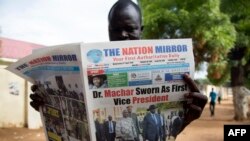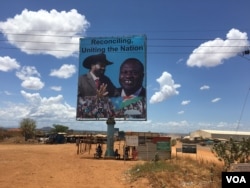South South's rebel leader Riek Machar finally returned to Juba Tuesday, to take his place as the country's vice-president, but analysts warn that distrust and rivalry between the government and rebels could undermine the next phase of the transition.
Receiving a jubilant welcome at Juba International Airport Tuesday, rebel leader Riek Machar returned home to become vice-president and create a new unity government with President Salva Kiir.
And Gatwech Wal says it was a day of celebration.
"Yeah, people are very very happy, people are very happy a lot...Traditional dancers are dancing inside...It was very, very wonderful. Elders, women, and children, they have come out in huge number," said Wal.
Wal is a South Sudanese lawyer living at an internally displaced persons camp within a U.N. base in Juba, where about 28,000 civilians have taken refuge. In all, the conflict has displaced over two million people.
The problem is one of many resulting from the civil war that kicked off in December 2013, prompting Machar to leave Juba in the first place.
“So, Machar’s return represents probably the most significant step so far in implementing the peace agreement that was signed in August 2015." said Casie Copeland, a senior analyst at the International Crisis Group. "But it is only one step. Following this, we will see the formation of the transitional government, potentially within the next 24 hours, and that will give us a real sign of where things are going, to see who the government and who the opposition to the various positions that they have.”
The last time Machar was Kiir’s vice president, it ended in civil war.
In July 2013, President Kiir, a Dinka, fired Machar, an ethnic Nuer. Kiir said Machar was plotting a coup.
Machar responded by announcing he would run for the presidency. Fighting began in Juba in December 2013 between Nuer and Dinka soldiers, quickly setting off violence throughout the country.
Machar’s return to Juba was delayed by months and then by an additional week of tense, last-minute wrangling over the numbers of troops and the weaponry he could bring.
John Hursh is a policy analyst at the Enough Project, a Washington-based atrocity prevention policy group.
“I think that there was a real setback with the kind of back and forth between the opposition and the government last week, trading accusations about whose fault this was, and why it hadn’t happened yet and you know, just kind of fostering concerns of mistrust between the two parties,” said Hursh.
The two sides finally reached an agreement amid pressure from the international community.
Samantha Power, the U.S. ambassador to the United Nations, acknowledged the challenges ahead.
“But everyone is clear-eyed – the difficulties that emerged in orchestrating Riek Machar’s return to Juba are symptomatic of the larger climate of mistrust, all the bloodshed that has occurred,” said Power.
Brookings Institution senior fellow John Mbaku agrees. “So if they continue to fight for power, then nothing is going to change in South Sudan, conditions will continue to deteriorate," he said.
In his speech at Machar’s inauguration Tuesday, Kiir apologized to the people of South Sudan for what he called “the situation we the leaders have created." His words have led many to hope that this is a fresh start.
Jason Patinkin contributed reporting from Juba.





